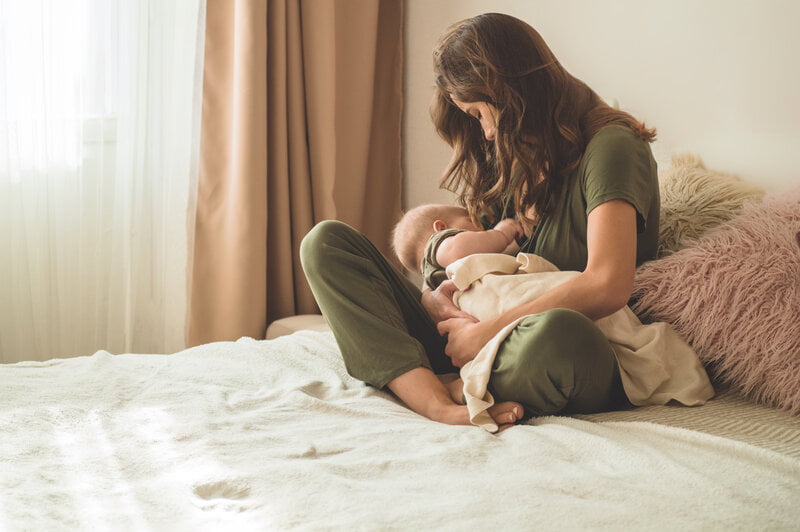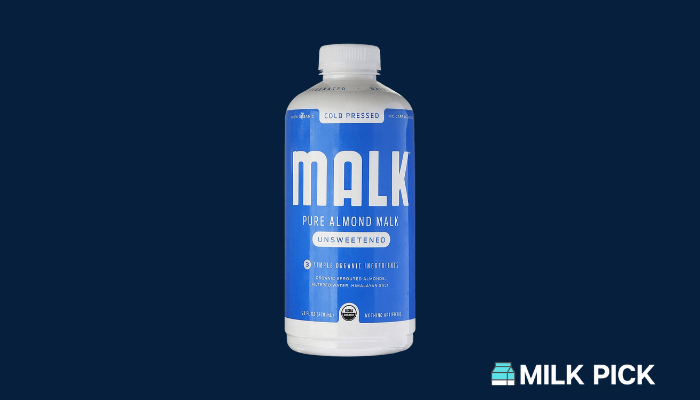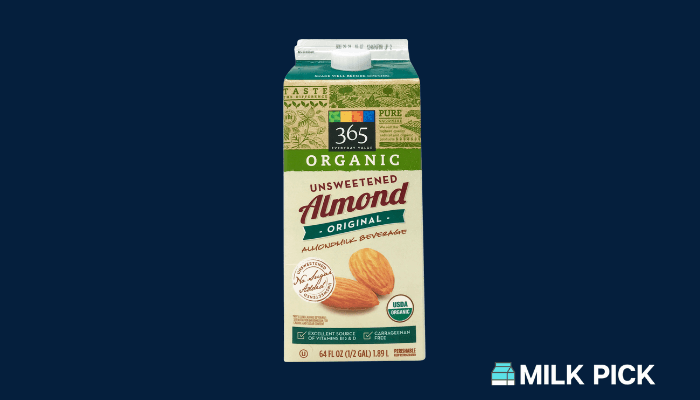Diet can be a concern when breastfeeding. After all, what you eat can directly affect your milk supply and your baby's diet.
While there may be a long list of things to avoid while breastfeeding, almond milk doesn’t have to be one of them.
Almond milk is good for breastfeeding as it is packed with beneficial nutrients that are great for you and your baby. It can also help with milk production and brain development.
Read on to discover further benefits and how you should consume almond milk while breastfeeding.
Is Almond Milk Safe While Breastfeeding?
Yes, if you do not have a nut allergy, almond milk is safe to consume while breastfeeding.
It contains healthy fats that can help you feel full throughout the day and boost your child's nutrition intake.
The vitamin E in almond milk can help strengthen your immune system, while vitamin A aids in eye health.
Almond milk also contains riboflavin (vitamin B2), which helps convert food into energy.
Almond milk is a great way to boost both your and your child’s nutrition intake. Not only does it provide the vitamins above, but it also contains iron, zinc, vitamin B12, and folate. These nutrients are essential for children since they need them to develop correctly.
Does Almond Milk Increase Your Breast Milk Supply?
The short answer is yes. Almonds are high in linoleic acid, a fatty acid that helps regulate the body’s breastfeeding hormones.
In addition, almonds also contain omega-3 fatty acids, which are also essential to helping the body’s breastfeeding hormones to regulate.
The more difficult question is why almond milk increases your breast milk supply.
Many factors play into whether you will have an increase in your breastmilk supply when consuming almonds.
Some of these factors include your age, BMI, and if you are breastfeeding exclusively or pumping as well.
The main reason almonds increase your breastmilk supply is that they are high in nutrients such as vitamin E and magnesium.
This helps boost your immune system, which can lead to more frequent let-downs during feedings, leading to increased calorie intake by the baby, resulting in increased production of colostrum (the first milk).

Other Benefits of Almond Milk While Breastfeeding
Almond milk is supposed to increase the creaminess and taste of your breast milk, making it more enjoyable for your baby.
It's also loaded with vitamins and minerals that are great for busy mothers to consume.
Almond milk is an excellent choice while nursing, particularly if it's fortified with calcium and vitamins. These nutrients help boost the health of your bones and teeth as well as support healthy cell growth in your body.
Calcium is essential not only for growing babies but also for supporting strong bones in adults. The extra calcium from fortified almond milk can help prevent osteoporosis later in life.
It also supports healthy brain development in babies by promoting brain cell growth.
How Much Almond Milk to Drink While Breastfeeding?
There is no specific amount of almond milk you should drink while breastfeeding. It's best to base your consumption to fit your caloric needs.
The general recommendation is to eat about 1,800 - 2,000 calories daily while breastfeeding.
The recommended serving size of almond milk is 8oz.
Unsweetened almond milk made with natural ingredients such as almonds, water and salt contains:
Almond Milk Nutrition Facts | |
|---|---|
Calories | 39 |
Protein | 1g |
Fat | 3g |
Carbohydrates | 4g |
Fiber | 1g |
Sugar | 2g |
Calcium | 184mg |
Potassium | 67mg |
Vitamin D | 41 IU |
Vitamin E | 6.33mg |
The nutritional value will vary depending on the brand you purchase.
Best Almond Milk for Breastfeeding
Almond milk is lactose-free, making it perfect for those who have trouble digesting dairy products.
However, not all brands of almond milk are created equal.
To ensure you get the best health benefits of this almond milk, you will want to opt for unsweetened milk made with simple ingredients.
Ideally, you will want this milk to contain water and almonds only.
Elmhurst Almond Milk
Elmhurst Almond Milk is made with only nuts and water, so it's as good as making the milk at home.
It's also gluten-free, soy-free, and vegan.
They're committed to keeping their product as pure and straightforward as possible, which means you can feel good about drinking it at any time, especially while breastfeeding.

Malk Almond Milk
Malk Almond Milk is simple, delicious milk made of only almonds, water, and salt. It's good for you and your baby—and it's great to drink while breastfeeding.
Malk’s made with almonds pasteurized at low temperatures to preserve their nutrients, as there are no preservatives in this milk.

Whole Foods 365 Organic Unsweetened Almond Milk
Whole Food's unsweetened almond milk is an excellent option if you are looking for something slightly more affordable. Unlike the two almond milks mentioned above, Whole Foods’ almond milk has a few extra ingredients.
However, it is fortified with extra vitamins and minerals, making this a great choice while breastfeeding.

Can Babies Directly Consume Almond Milk?
Almond milk isn't recommended for babies under one year old to consume on their own. It does not provide the same nutrients breast milk or formula gives.
Babies over 1-year-old can consume small amounts of almond milk without any problems.
Even if your baby (under one year old) has a milk allergy, you should not give them almond milk without first consulting your pediatrician.
Related: Is Almond Milk Safe For Babies?
Almond Milk Vs. Cow’s Milk While Breastfeeding
Cow’s milk is often recommended over almond milk for vital nutrients such as calcium, protein and vitamin D.
However, almond milk contains less sugar than cow's milk.
On average, a cup of unsweetened almond milk contains around 2 grams of sugar, while a cup of cow's milk contains around 12 grams of sugar. While this may seem small, it adds up over time.
Ways to Use Almond Milk While Breastfeeding
You can consume almond milk in a variety of ways. You can replace almost anything you add milk to with almond milk or choose to enjoy it on its own.
In Coffee or Tea
Almond milk can be used as a milk or creamer replacement in your coffee or tea. It will cut the bitterness and supply a slightly creamy taste.
However, depending on the acidity and temperature of your coffee, it may cause the almond milk to curdle. To avoid this, you can opt for an almond milk creamer.
While you can still enjoy coffee and tea while breastfeeding, you may want to keep in mind that the recommended caffeine intake is 300mg daily.
In Your Cereal
Pour almond milk over your favorite cereal or granola, and enjoy!
Unlike some plant-based milk, almond milk has a great stand-alone flavor.
While it can be a bit thinner than dairy milk, it has a similar sweetness.
Add it to Smoothies
Almond milk is an excellent addition to smoothies as It adds to the health benefits and creates a smooth and creamy consistency.
The natural sweetness of the almond milk and nutty taste help to enhance the overall flavor.
Use it for Baking
You can use almond milk to replace dairy milk in any recipe. You don’t have to sacrifice the creamy texture that cow’s milk provides.
You can even turn it into a vegan version of buttermilk with just a few extra steps. Check out this video below to discover how.
Things to Consider Before Consuming Almond Milk While Breastfeeding
While almond milk has a range of benefits for both nursing mothers and their babies, there are a few things you will want to be aware of if you choose to consume almond milk while breastfeeding.
Be Cautious of a Nut Allergy
Babies can develop allergies to specific foods the mother is eating while breastfeeding, and nuts happen to be one of the most common foods that cause allergies.
If a nut allergy runs in your or your partner's family, you should consult your doctor before frequently adding almond milk to your diet.
Lack of Particular Nutrients
Suppose you're making almond milk at home or opting for a brand that isn’t fortified with specific vitamins and minerals.
In that case, it will lack nutrients essential to both you and your baby—specifically vitamin D and protein.
Cow’s milk and soy milk typically provide seven to eight grams of protein in one cup while almond milk only provides one gram per cup.
You could develop vitamin deficiency if you aren't cautious of your vitamin intake or eating specific food that provides these nutrients.
Enjoy Almond Milk While Breastfeeding
If you are vegan, lactose intolerant or just looking to replace cow's milk from your diet, go ahead and pour a glass of almond milk.
It’s safe to drink while breastfeeding and packed with vitamins and minerals from which you and the baby can benefit.
Are you wondering what other plant-based milk you can enjoy while breastfeeding? No need to worry; we have you covered.
Check out our article about the benefits of oat milk while breastfeeding!
